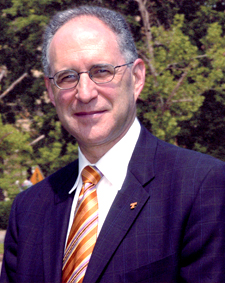
Robert Holub recently sat down with Tennessee Today to discuss why retention is such an important issue for UTK.
If you are seeing this rather than the video you expected you may need to upgrade your Flash player to a newer version, or enable javascript on your browser.
var so = new SWFObject(‘https://news.utk.edu/media/mediaplayer.swf’,’mpl’,’140′,’20’,’7′); so.addParam(‘allowscriptaccess’,’true’); so.addParam(‘allowfullscreen’,’false’); so.addVariable(‘file’,’https://news.utk.edu/media/holub-retention.flv’); so.addVariable(‘height’,’20’); so.addVariable(‘width’,’140′); so.write(‘flashcontent’);
Student retention rates at UTK have been getting a lot of attention lately so Tennessee Today asked Provost Robert Holub some questions about retention to help the campus community understand the issues involved.
What is our retention rate and how does it compare to other universities?
The retention rate for first-time, full-time freshmen who began in Fall 2006 is 84 percent. That’s an improvement over the previous rate of 81.7 percent and rates that hovered between 75 percent and 80 percent for the decade prior to 2006. Still, along the way to graduation, we lose more students than many other major research universities. The largest loss comes between the freshman and sophomore years.
Why is our retention rate important?
Retention is one of the primary measures of institutional success. High retention rates are also a sign that a campus is doing a good job educating its students. The best public universities have high retention rates, and we aspire to be counted among them.
Why do students drop out?
In December 2006, the Student Success Center partnered with University Housing to administer an exit survey to first-year students leaving the university. The top three reasons cited for leaving: "UTK is too large and impersonal"; "I had trouble adjusting personally to UTK"; and "I did not feel like I fit in at UTK."
Also, statistics show that students who make low grades are more prone to drop out: 15.6 percent of UTK students who earn below a 2.0 in their first terms do not return for a second term.
Unfortunately, in recent student behavior studies, UTK students report spending 6 to 10 hours per week preparing for class – compared to students at comparable institutions who say they spend 11 to 15 hours per week preparing.
How are we trying to increase our retention rate?
This is one of our priorities, and I’ve assembled a team to help achieve that goal.
In December 2006, I appointed Todd A. Diacon as vice provost for academic operations, charging him with improving student retention, perseverance and graduation rates. In March 2007, I appointed Terrell Strayhorn as my special assistant. An assistant professor in educational psychology and counseling, Strayhorn is a nationally recognized authority on student retention.
Also in mid-December 2006, I assembled a Retention Task Force. The group reviewed research and looked at local and national data. The group then set two major goals: 1) Improve our first-to-second-year retention rate to the level of our Tennessee Higher Education Commission peer institutions; and 2) Improve the quality of the undergraduate experience at UTK.
Ruth Darling, assistant vice provost, chair of the Retention Task Force and director of the Student Success Center says we can help students feel more comfortable at UT by thinking small and creating programs to address students’ successful integration into UT’s various academic and social communities. Students want to "fit in" and interact in meaningful ways with peers, faculty, staff and the campus environment. Several new programs such as the 129 seminars and Welcome Week have been launched to do just that.
Meanwhile, the Student Success Center now requires at-risk students to attend -academic success workshops and offers student-led study groups in courses that historically have proven challenging for our first-year students.